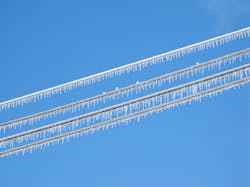FERC, NERC Release Report on Extreme Cold-Weather Events
The Federal Energy Regulatory Commission (FERC) and North American Electric Reliability Corp. (NERC) recently released a joint staff report that emphasized the need for generation owners and transmission operators to adequately prepare for winter weather conditions to ensure system reliability.
On Jan. 17-18, 2018, MidContinent Independent System Operator (MISO) and Southwest Power Pool (SPP) experienced a period of record cold weather that caused a higher than normal peak load.
MISO
On Jan. 17, the MISO South region had a peak load of 32.1 GW, which was only 2% lower than its highest ever peak of 32.7 GW in August 2015. There was also a total of 4.5 GW of generation lost on Jan. 16-17 due to unplanned outages. Regional operators were called for voluntary reductions in electricity usage to keep the systems stable. Despite many emergency actions, what ultimately helped MISO avoid shedding load on the morning of Jan. 17 was the emergency energy purchases from neighbors, which were acquired from Georgia System Operations Corp. (150 MW), Southern Co. (700 MW) and TVA (300 MW).
Southwest Power Pool
SPP also issued a Cold Weather Alert from Jan. 15-18. A new winter peak of 43.5 GW occurred on Jan. 17. Due to the high loads in SPP and neighboring systems, SPP was forced to reconfigure transmission. SPP also experienced voltage problems during this period in parts of Oklahoma and Missouri. SPP has since implemented post-contingent reconfiguration and load-shed plans.
MISO, SPP, TVA, and Southeastern Reliability Coordinators have met on several occasions to review the January 2018 event, discuss lessons learned and future coordination enhancements.
FERC and NERC Joint Staff Report
The recent FERC and NERC report finds that cold weather events continue to result in unplanned outages that threaten reliable system operations, despite prior guidance. It recommends the development of mandatory Reliability Standards requiring generator owner/operators to prepare for the cold weather and provide information about those preparations to their Reliability Coordinators and Balancing Authorities.
Along with a Reliability Standard, enhanced outreach and actions by system operators to encourage generator performance can also help to prevent a recurrence of the large-scale unplanned outages like those seen during this event, the 2014 Polar Vortex and the 2011 Southwest cold weather event.
The report makes a number of recommendations and identifies sound practices. Some recommendations echo the 2011 Southwest event report, including:
- Generator owners and operators should perform winterization activities to prepare for cold weather, and should ensure the accuracy of their units' ambient temperature design specifications;
- Balancing Authorities and Reliability Coordinators should be aware of generating units' specific limitations, such as ambient temperatures beyond which they cannot be expected to perform or the lack of firm gas transportation;
- Planning coordinators and transmission planners should jointly develop and study scenarios to be better prepared for seasonal extreme weather conditions; and
- Transmission owners and operators should conduct analyses that delineate different summer and winter ratings for both normal and extreme conditions.
About the Author
Martha Davis
Senior Director of Content
Prior to working at T&D World and Utility Analytics Institute, Martha worked as an executive in the energy industry for about 15 years. She has held various regulatory and government affairs positions and had the opportunity to shape public policy.
Martha has a B.A. from Westminster College in Fulton, MO; completed specialized legal and public policy coursework at American University in Washington, D.C.; M.P.A. Public Affairs and M.B.A. Business Administration both from the University of Missouri. She is currently a doctoral candidate at the University of Denver where she is researching business analytics, innovation and regulation.
